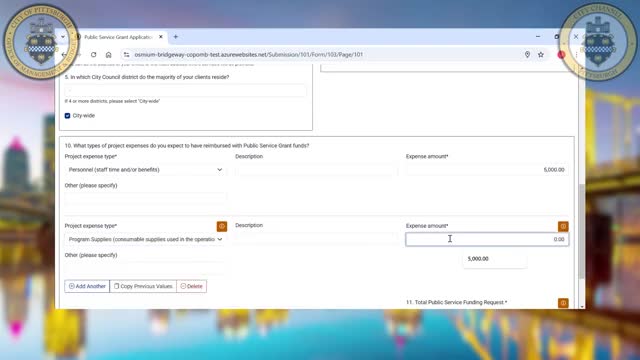City of Pittsburgh outlines 2025 CDBG public service grant rules, timeline and application steps
Get AI-powered insights, summaries, and transcripts
Subscribe
Summary
City of Pittsburgh Community Development staff explained eligibility, documentation, timeline and the new Bridgeway portal for the 2025 Community Development Block Grant (CDBG) public service awards, which total $550,000 and require income verification or service to presumed-benefit populations.
City of Pittsburgh officials held an information session explaining the 2025 Community Development Block Grant (CDBG) public service grant application process, eligibility rules, documentation requirements and timeline.
Kelly Russell, assistant director for the Office of Management and Budget’s Community Development division, said the city set aside $550,000 for public service grants from its CDBG allocation and that “This is a reimbursement grant, which means you have to spend money to receive money.”
The grant program matters because it funds nonprofit services for low- and moderate-income residents. Russell said the funds must serve people who are low or moderate income and that applicants should either serve one of eight "presumed benefit" populations or verify income for at least 51% of program clients.
City staff front-loaded the eligibility and timeline details. Applications must be submitted through the city’s new online portal, Bridgeway, and the recommended request range is a $10,000 minimum to a $50,000 maximum. Russell said, “Applications are due Monday, April 7 at 5PM.” She and program staff emphasized that awards will be announced only after the city’s annual action plan is approved by HUD and that contracts will not begin until January 2026; expenses incurred before January 2026 will not be reimbursed.
Program supervisor Josh Arroyo reviewed income verification and documentation requirements. Arroyo said income must be based on all household members age 18 and older, include wages, unemployment, TANF and Social Security, and be current within the last 90 days. He said organizations that cannot rely on a presumed-benefit population must verify each client’s income and warned that "Funded organizations will not be able to use estimates or averages to determine income eligibility." The staff also said the program follows an 80% area median income (AMI) eligibility threshold based on Pittsburgh’s median income table.
Eligibility and administrative requirements described by staff include: - Organizational status: applicants must be 501(c)(3) nonprofits, have articles of incorporation and written bylaws, have filed an IRS Form 990 within the past year (990, 990-N or 990-EZ), and may not use fiscal sponsors. - SAM.gov: "You must have a full and active SAM.gov registration and the SAM.gov registration must be renewed annually," Russell said; a Unique Entity ID or UEI alone is not sufficient. - Insurance: general liability insurance is required for the contract term and the City of Pittsburgh must be listed as an additional insured on the certificate; workers’ compensation insurance is required only if the organization has paid staff (organizations without paid staff submit a waiver). - Reimbursement process: subrecipients must submit invoices and supporting documentation after a contract is executed; the city will issue payment after review.
Russell and Arroyo listed the eligible project types and application attachments. Required attachments include an IRS determination letter, articles of incorporation, bylaws, the most recent Form 990 (or an explanatory letter for churches or newly formed organizations that have not filed), and a board resolution authorizing the application. Applicants must build a line-item budget in the Bridgeway form that sums to the grant request.
The staff walked through Bridgeway account setup, organization creation, and the three-part submission (organization details, project description, budget/attachments). Russell said a new organization must be created in the portal and that entering "pending" is acceptable in the UEI field if an applicant is still securing the Unique Entity ID. Osmium Data Solutions will send a verification email to new Bridgeway accounts, staff said.
Staff announced two question-and-answer sessions for applicants: March 18 from 5 to 6 p.m. and March 19 from 1 to 2 p.m., and provided the program’s contact and resources on EngagePGH. Russell said decisions on awards will not be available until late fall 2025 after the mayor’s office, city council and HUD review and that contracts are expected to begin in January 2026.
For more information, staff directed applicants to the Community Development page on EngagePGH and provided an email contact for the office.
